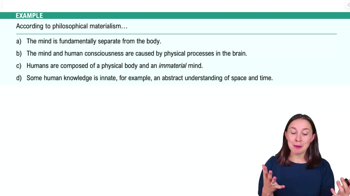Table of contents
- 1. Introduction to Psychology1h 43m
- 2. Psychology Research2h 20m
- 3. Biological Psychology2h 41m
- 4. Sensation and Perception28m
- 5. Consciousness and Sleep32m
- 6. Learning41m
- 7. Memory34m
- 8. Cognition37m
- 9. Emotion and Motivation35m
- 10. Developmental Psychology33m
- 11. Personality48m
- 12. Social Psychology41m
- 13. Stress and Health41m
- 14. Psychological Disorders44m
- 15. Treatment47m
1. Introduction to Psychology
What is Psychology?
Struggling with Psychology?
Join thousands of students who trust us to help them ace their exams!Watch the first videoMultiple Choice
Within the field of psychology, the term mental processes refers to
A
outward actions.
B
only human behavior.
C
all internal, covert activity of the mind.
D
overt reactions.
 Verified step by step guidance
Verified step by step guidance1
Understand that 'mental processes' in psychology refers to activities that occur within the mind.
Recognize that these processes are internal and covert, meaning they are not directly observable.
Differentiate between 'mental processes' and 'behavior,' where behavior can be overt and observable.
Consider examples of mental processes such as thinking, memory, and perception, which are internal activities.
Acknowledge that mental processes encompass all internal activities of the mind, not just human behavior or outward actions.

 1:53m
1:53mWatch next
Master Intro to Psychology with a bite sized video explanation from Hannah Gordils
Start learningRelated Videos
Related Practice
































